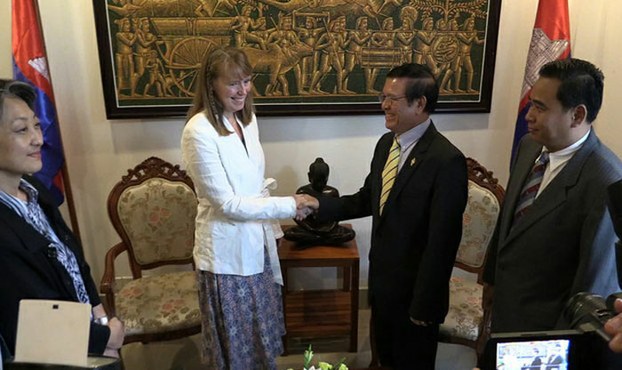Special rapporteur on human rights in Cambodia expresses equal treatment concerns
| Publisher | Radio Free Asia |
| Publication Date | 12 October 2016 |
| Cite as | Radio Free Asia, Special rapporteur on human rights in Cambodia expresses equal treatment concerns, 12 October 2016, available at: https://www.refworld.org/docid/5811ff1f4.html [accessed 20 May 2023] |
| Disclaimer | This is not a UNHCR publication. UNHCR is not responsible for, nor does it necessarily endorse, its content. Any views expressed are solely those of the author or publisher and do not necessarily reflect those of UNHCR, the United Nations or its Member States. |
2016-10-12
 The UN Special Rapporteur on the situation of human rights in Cambodia Rhona Smith (L) meeting with Cambodia National Rescue Party leader Kem Sokha at the party headquarters, Oct. 12, 2016. RFA / Phann Yasy
The UN Special Rapporteur on the situation of human rights in Cambodia Rhona Smith (L) meeting with Cambodia National Rescue Party leader Kem Sokha at the party headquarters, Oct. 12, 2016. RFA / Phann Yasy
The U.N. special rapporteur on human rights in Cambodia on Wednesday urged the country's leaders to apply the law equally, following a meeting with opposition leader Kem Sokha, whose supporters say he is a frequent target of politicized legal action.
"There are many issues that need to be discussed to make sure that Cambodia's constitution and law are implemented fairly and equally by the government," Rhona Smith told reporters after the meeting at Cambodia National Rescue Party (CNRP) headquarter in Phnom Penh.
On a fact-finding mission in the country, Smith met with the acting CNRP president Kem Sokha, who has been holed up in the party headquarters since police attempted to arrest him in May for ignoring court orders to appear as a witness in a pair of defamation cases related to his alleged affair with a hairdresser.
Application of the law has become a big issue in Cambodia as Prime Minister Hun Sen and the ruling Cambodian People's Party have been accused of using the courts to go after opposition politicians and government critics.
CPP spokesperson Sok Eysan told RFA that he did not yet know if Smith would meet Hun Sen on behalf of the government or the party.
He dismissed the complaints of the opposition lawmakers and government critics saying the oppositions problems are legal matters, not political ones.
While Smith was concerned about possible abuses in the legal system, she also expressed concern about the CNRP's stance regarding ethnic minorities like the Vietnamese living in Cambodia.
"We did not focus just on the Vietnamese, but on immigrants in general," said senior CNRP official Eng Chhai Eang.
"When we lead the country we will have a clear stance on principles," he added. "We will implement in accordance with the Cambodian laws on nationality and immigration to ensure that all nationals who live in Cambodia are legal."
The two countries have had a difficult relationship for centuries, and Hun Sen's relationship with the Vietnamese has been a source of tension.
Hun Sen emerged as a major force in Cambodia during the period when the Vietnamese ousted the Khmer Rouge.
When the Khmer Rouge regime was defeated, Hun Sen was appointed as Deputy Prime Minister and Foreign Minister of the Vietnamese-installed People's Republic of Kampuchea/State of Cambodia (PRK/SOC) in 1979.
As Cambodian foreign minister and then prime minister, Hun Sen played an important role in the 1991 Paris Peace Talks that brokered peace among Cambodia's warring factions.
In recent times, the CNRP has used that relationship as a political foil with opposition leaders often accusing Hun Sen of ceding territory to the Vietnamese.
Smith also met with Minister of Social Affairs Vong Soth and the representative of the U.N. High Commissioner on Refugees Wan-Hea Lee.
That two-hour meeting covered various issues including children, the disabled, homelessness and the Prey Speu detention center that has long been denounced by rights groups for abuses.
In 2015 two people died at the center that serves as a holding facility for homeless drug addicts and others detained in the capital.
She told the press that she wants to see changes in this center, but did not release the details.
"We must make sure that they have a safe living environment and all their rights are protected, especially the rights to receive safety, food, water and hygiene," she told reporters.
Reported by Zakariya Tin and Heng Sun for RFA's Khmer Service. Translated by Yanny Hin. Written in English by Brooks Boliek.
Link to original story on RFA website
